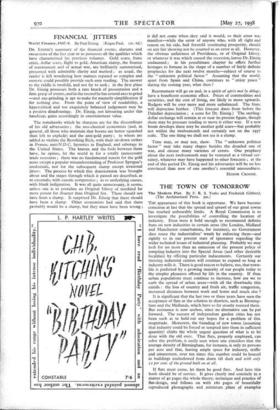FINANCIAL ." JITTERS
World Finance, 1937-8. By Paul Einzig. (KeganPauL I2s. 6d.) DR. EINZIG'S summary of the financial events, alarums and excursions of the last year or so possesses all the qualities which have characterised his previous volumes. Gold scare, franc crisis, dollar scare, flight to gold, 'American slump, the finance of rearmament and of actual war, are brilliantly summarised, presented with admirable clarity and method ; as usual, the reader is left wondering how matters reputed so complex and esoteric could possibly provide such easy reading. The answer to the riddle is twofold, and not far to seek ; in the first place Dr. Einzig possesses both a rare knack of presentation and a firm grasp of events, and in the second he has several axes to grind —and axe-grinding is apt to make for masterly simplification if for nothing else. From the point of view of readability, a hypercritical and too exquisitely balanced judgement may be a positive disadvantage. Dr. Einzig, not labouring under this handicap, gains accordingly in entertainment value.
The tomahawks which he sharpens are for the discomfiture Of his old adversaries ; the neo-classical economists (and, in general, all those who Maintain that booms are better squashed -than left to explode) and the anti-gold party ; to whom are added as victims the Revolting Rich, with their sit-down strikes in France, anti-N.D.C. hysterics in England, and sabotage in the United States. The knaves and the fools between them have, he opines, let the world in for a totally unnecessary trade recession ; there was no fundamental reason for the gold scare except a popular misunderstanding of Professor Sprague's credentials, nor for the subsequent slump except irrational jitters. The process by which this deterioration was !brought about and the stages through which it passed are described, as to externals, with caustic competence; as to underlying causes, with blank indignation. . It was all quite unnecessary, it seems, unless one is to postulate an Original Idiocy of mankind far more potent for disaster than Original Sin. There should not have been a slump. It surprised Dr. Einzig that there should have been a slump. Other economists had said that there probably would be a slump, but they must have been wrong ;
it did not ,come wherhs.hey said it would, so their error was Manifest—while the error of anyone who, with all right and reason on his side, had foretold continuing prosperity, should on any fair showing not be counted as an error at all. However, the obvious unfairness of Providence, or of Original Idiocy, or whatever it was which caused the recession, leaves Dr. Einzig undaunted ; in his penultimate chapter he offers further hostages to fortune in the shape of a number of fairly definite prophecies for the next twelve months—subject of course to the "unknown political factor." Assuming that the world, apart from Spain and China, continues to "enjoy peace" during the coming year, what then ?
Rearmament will go on and, in a spirit of apres moi la deluge, have a beneficent economic effect. Prices of commodities and securities, and the cost of living, are likely to move upwards. Budgets will be ever more and more unbalanced. The franc will depreciate further. (This forecast dates from before the Daladier depreciation'; a score for Dr. Einzig.) The sterling- dollar exchange will remain at or near its present figure, though there may be pressure tending to move it either way. If a new boom develops there may be another gold scare—but probably not within the twelvemonth and certainly not on the 1937 scale. The one thing we shall not see is a slump.
Time may, or may not, show. The "unknown political factor" may take many shapes besides the dreaded one of war, and excuse many varieties of errors. One prophecy' about the next twelvemonth may be ventured as a virtual cer- tainty, whatever may have happened to other forecasts ; at the end of this period Dr. Einzig and his adversaries will be no less convinced than now of one another's essential unsoundness.
HONOR CROOME.


















































 Previous page
Previous page